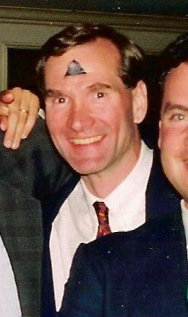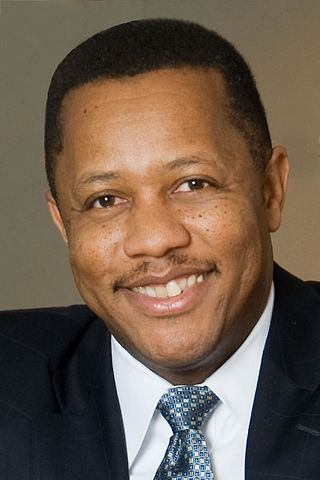Related Research Articles
Passive management is an investing strategy that tracks a market-weighted index or portfolio. Passive management is most common on the equity market, where index funds track a stock market index, but it is becoming more common in other investment types, including bonds, commodities and hedge funds.
A mutual fund is an investment fund that pools money from many investors to purchase securities. The term is typically used in the United States, Canada, and India, while similar structures across the globe include the SICAV in Europe and open-ended investment company (OEIC) in the UK.

Fidelity Investments, commonly referred to as Fidelity, earlier as Fidelity Management & Research or FMR, is an American multinational financial services corporation based in Boston, Massachusetts. The company was established in 1946 and is one of the largest asset managers in the world with $4.3 trillion in assets under management, and, as of December 2022, their assets under administration amount to $10.3 trillion. Fidelity Investments operates a brokerage firm, manages a large family of mutual funds, provides fund distribution and investment advice, retirement services, index funds, wealth management, securities execution and clearance, asset custody, and life insurance.

Legg Mason was an American investment management and asset management firm headquartered in Baltimore, founded in 1899 and acquired by Franklin Templeton Investments as of July 2020. As of December 31, 2019, the company had $730.8 billion in assets under management, including $161.2 billion in equity assets, $420.2 billion in fixed income assets, $74.3 billion in alternative assets, and $75.1 billion in liquidity assets.
Net asset value (NAV) is the value of an entity's assets minus the value of its liabilities, often in relation to open-end, mutual funds, hedge funds, and venture capital funds. Shares of such funds registered with the U.S. Securities and Exchange Commission are usually bought and redeemed at their net asset value. It is also a key figure with regard to hedge funds and venture capital funds when calculating the value of the underlying investments in these funds by investors. This may also be the same as the book value or the equity value of a business. Net asset value may represent the value of the total equity, or it may be divided by the number of shares outstanding held by investors, thereby representing the net asset value per share.
Investment management is the professional asset management of various securities, including shareholdings, bonds, and other assets, such as real estate, to meet specified investment goals for the benefit of investors. Investors may be institutions, such as insurance companies, pension funds, corporations, charities, educational establishments, or private investors, either directly via investment contracts/mandates or via collective investment schemes like mutual funds, exchange-traded funds, or REITs.
A unit trust is a form of collective investment constituted under a trust deed. A unit trust pools investors' money into a single fund, which is managed by a fund manager. Unit trusts offer access to a wide range of investments, and depending on the trust, it may invest in securities such as shares, bonds, gilts, and also properties, mortgage and cash equivalents. Those investing in the trust own "units" whose price is called the "net asset value" (NAV). The number of these units is not fixed and when more is invested in a unit trust, more units are created.
Wilshire Associates, Inc. is an American independent investment management firm that offers consulting services and analytical products and manages fund of funds investment vehicles for a global client base. Wilshire manages capital for more than 600 institutional investors globally representing more than $8 trillion of capital. Wilshire is also known for the creation of the Wilshire 5000 stock index in 1974 and more recently the Wilshire 4500 stock index.

David Frederick Swensen was an American investor, endowment fund manager, and philanthropist. He was the chief investment officer at Yale University from 1985 until his death in May 2021.

T. Rowe Price Group, Inc. is an American publicly owned global investment management firm that offers funds, subadvisory services, separate account management, and retirement plans and services for individuals, institutions, and financial intermediaries. The firm has assets under management of more than $1.6 trillion and annual revenues of $6.2 billion as of 2020, placing it 447 on the Fortune 500 list of the largest U.S. companies. Headquartered at 100 East Pratt Street in Baltimore, Maryland, it has 5,000 employees in Baltimore and 16 international offices serving clients in 47 countries.
The following outline is provided as an overview of and topical guide to finance:

An alternative investment, also known as an alternative asset or alternative investment fund (AIF), is an investment in any asset class excluding stocks, bonds, and cash. The term is a relatively loose one and includes tangible assets such as precious metals, collectibles and some financial assets such as real estate, commodities, private equity, distressed securities, hedge funds, exchange funds, carbon credits, venture capital, film production, financial derivatives, cryptocurrencies, non-fungible tokens, and Tax Receivable Agreements. Investments in real estate, forestry and shipping are also often termed "alternative" despite the ancient use of such real assets to enhance and preserve wealth. Alternative investments are to be contrasted with traditional investments.
A portfolio manager (PM) is a professional responsible for making investment decisions and carrying out investment activities on behalf of vested individuals or institutions. Clients invest their money into the PM's investment policy for future growth, such as a retirement fund, endowment fund, or education fund. PMs work with a team of analysts and researchers and are responsible for establishing an investment strategy, selecting appropriate investments, and allocating each investment properly towards an investment fund or asset management vehicle.

The CFA Council of India was established by The ICFAI University, Tripura as a constituent body for the development and regulation of the CFA Profession on sound ethical lines. All the CFAs from the ICFAI University, Tripura are eligible to become members of the Council. All members are required to abide by the code of ethics of the Council.

Eugene A. Profit is an American investor, entrepreneur, philanthropist and former American football cornerback for the New England Patriots and Washington Redskins. He is the founder, president, CEO, and portfolio manager of Profit Investment Management, an investment management firm located in the Washington, DC metropolitan area.

An investment fund is a way of investing money alongside other investors in order to benefit from the inherent advantages of working as part of a group such as reducing the risks of the investment by a significant percentage. These advantages include an ability to:
Betashares is a leading Australian provider of exchange-traded funds (ETFs). The company manages the broadest range of ETFs in Australia across major assets classes. Betashares is based in Sydney, Australia with offices in Melbourne, Brisbane and Perth.
Michael J. Mauboussin heads consilient research at Morgan Stanley division Morgan Stanley Investment Management's Counterpoint Global, an open-end mutual fund. Previously, he was director of research at BlueMountain Capital and head of global financial strategies at Credit Suisse, where he advised clients on valuation and portfolio positioning, capital markets theory, competitive strategy analysis, and decision making. He is also an adjunct professor of finance at the Columbia Business School and serves as chairman emeritus of the board of trustees at the Santa Fe Institute, a multi-disciplinary research center for complex adaptive systems, after serving as its chairman from 2012 until retiring in May 2021.
Royce Investment Partners is a family of mutual funds that focuses primarily on small-cap investing, and has been considered one of the industry's most experienced smaller-company stock pickers. Royce & Associates, LLC serves as investment adviser to all Royce portfolios, including open-end mutual funds and closed-end funds.
References
- 1 2 3 "The Greatest Investors: Bill Miller | Investopedia" (PDF). Investopedia. 2003-12-01. Retrieved 2017-02-18.
- 1 2 3 4 5 Schuessler, Jennifer (16 January 2018). "A Wall Street Giant Makes a $75 Million Bet on Academic Philosophy". New York Times. Retrieved 17 January 2018.
- ↑ "What Bill Miller says is his main advantage and why Amazon will double in 3 years". Baltimore Business Journal. Retrieved 2023-04-04.
- ↑ "ClearBridge Investments". www.clearbridge.com.
- ↑ Belvedere, Matthew J. (2016-02-03). "Bill Miller: I lost 20%, but still bullish". CNBC. Retrieved 2017-02-18.
- ↑ Moyer, Liz (9 January 2018). "Bill Miller says he's started a separate bitcoin fund, believes ripple run has gone too far". CNBC. Retrieved 17 January 2018.
- ↑ "Investing legend and Amazon bull Bill Miller likes Whole Foods deal, plus Valeant and bitcoin". CNBC. 16 June 2017. Retrieved 9 February 2017.
- ↑ January 6, 2005 Wall Street Journal article titled "Bill Miller Dishes on his Streak and his Strategy".
- 1 2 Mauboussin, Michael J. (2007-11-23). More Than You Know: Finding Financial Wisdom in Unconventional Places (Updated and Expanded). Columbia University Press. ISBN 978-0-231-14372-1.
- ↑ "Randomness and the lost lesson of Bill Miller". Financial Times .
- ↑ "Interview with Former Philosophy Graduate Student and Investor Bill Miller". 2 March 2018.
- ↑ McNulty, Ray (December 30, 2021). "'Historic' support: Island resident Miller donates $50M more to Johns Hopkins". vb32963online. Retrieved 2 April 2022.
- ↑ Lim, Paul J. (August 17, 2016). "3 Important Lessons from the Downfall of Legendary Stockpicker Bill Miller". Money.com . Archived from the original on January 22, 2021. Retrieved 17 January 2018.
- ↑ Winter 2022, Published (2022-12-16). "Class Notes". The Hub. Retrieved 2023-02-22.